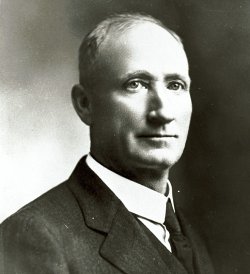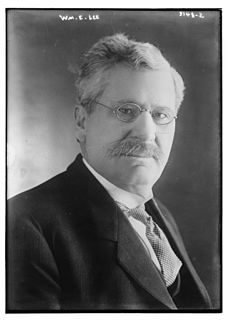Related Research Articles

The history of the petroleum industry in the United States goes back to the early 19th century, although the indigenous peoples, like many ancient societies, have used petroleum seeps since prehistoric times; where found, these seeps signaled the growth of the industry from the earliest discoveries to the more recent.

Spindletop is an oil field located in the southern portion of Beaumont, Texas, in the United States. The Spindletop dome was derived from the Louann Salt evaporite layer of the Jurassic geologic period. On January 10, 1901, a well at Spindletop struck oil. The Spindletop gusher blew for 9 days at a rate estimated at 100,000 barrels (16,000 m3) of oil per day. Gulf Oil and Texaco, now part of Chevron Corporation, were formed to develop production at Spindletop. The Spindletop discovery led the United States into the oil age. Prior to Spindletop, oil was primarily used for lighting and as a lubricant. Because of the quantity of oil discovered, burning petroleum as a fuel for mass consumption suddenly became economically feasible.

Gulf Oil was a major global oil company from 1901 until March 15, 1985. The eighth-largest American manufacturing company in 1941 and the ninth-largest in 1979, Gulf Oil was one of the so-called Seven Sisters oil companies. Prior to its merger with Standard Oil of California, Gulf was one of the chief instruments of the Mellon family fortune; both Gulf and Mellon Financial had their headquarters in Pittsburgh.

Beaumont is a city in and the county seat of Jefferson County, Texas, in the United States, within the Beaumont–Port Arthur Metropolitan Statistical Area. Located in Southeast Texas on the Neches River about 85 miles (137 km) east of Houston, Beaumont had a population of 118,296 at the time of the 2010 census, making it the 30th most populous city in the state of Texas.

Sunoco LP is an American master limited partnership organized under Delaware state laws and headquartered in Dallas, Texas, that is a wholesale distributor of motor fuels. It distributes fuel to more than 7,300 Sunoco-branded gas stations, almost all of which are owned and operated by third parties. The partnership is controlled by Energy Transfer Partners.

Spindletop Hall, located at 3414 Iron Works Pike in Lexington, KY, is the former home of Pansy Yount, wife of Miles Franklin Yount of the Yount-Lee Oil Company. It is currently the home of the University of Kentucky's staff, faculty, and alumni club, which was founded in 1962.

Pattillo Higgins was an American businessman and a self-taught geologist. He earned the nickname the "Prophet of Spindletop" for his endeavors in the Texas oil business, which accrued a fortune for many. He partnered to form the Gladys City Oil Gas and Manufacturing Company, and later established the Higgins Standard Oil Company.

Humble Oil and Refining Co. was an American oil company founded in 1911 in Humble, Texas. In 1919, a 50% interest in Humble was acquired by Standard Oil of New Jersey which acquired the rest of the company in September 1959 and merged with its parent to become Exxon Corporation in 1973.
Glenn Herbert McCarthy was an American oil tycoon. The media often referred to him as "Diamond Glenn" and "The King of the Wildcatters". McCarthy was an oil prospector and entrepreneur who owned many businesses in various sectors of the economy. McCarthy founded the Shamrock Hotel in Houston, which garnered him national fame and inspired the fictional character Jett Rink in Edna Ferber's 1952 novel Giant which, in 1956, became a film, which starred James Dean in the role.
Miles Franklin "Frank" Yount eventually came to head up one of the most successful private oil companies in the United States.
Thomas Peter Lee was born on March 19, 1871, in Petroleum, West Virginia to Alexander and Martha Jane Mount Lee, Thomas Peter Lee left school at the age of sixteen and went to work in the oil fields, first in his native state and then in Ohio. In 1903 he moved to Saratoga, Texas, where he gained employment with the newly formed Texas Company, which eventually became Texaco, and when he left that organization ten years later, he had attained the rank of general superintendent of production. While there, however, he became friends with J.S. Cullinan, and the two, along with Emerson Francis Woodward, Will C. Hogg, and James L. Autry, joined in 1914 to form the Farmers Petroleum Company, of which Lee became president.

William Ellsworth Lee was an American businessman.
Emerson Francis Woodward was an oilman who co-founded the Yount-Lee Oil Company which made a major discovery at the Spindletop field near Beaumont, Texas. In 1935, Woodward and partners sold the company to Standard Oil & Gas for $46 million.

James Addison Baker was an American attorney and banker in Houston, Texas. He was born James Addison Baker, Junior, and "Junior" appeared in his signature for many years. After the death of his father in 1897, he started signing his name "Captain James A. Baker," and from that point on people referred to him as Captain Baker.

Masterson is an unincorporated community in southern Moore County, Texas, United States of the Texas Panhandle. It lies along the concurrent U.S. Routes 87 and 287, south of the city of Dumas, the county seat of Moore County. Its elevation is 3,704 feet (1,129 m). Although Masterson is unincorporated, it has a post office, with a ZIP code of 79058.
Michel Thomas Halbouty was an American geologist, petroleum engineer, and wildcatter. Credited with discovering more than 50 oil and gas fields, he twice declared bankruptcy, but came back each time to regain wealth. He authored hundreds of technical articles on petroleum geology, and two book-length histories of famous oil fields. Halbouty is often described, including in his New York Times obituary, as “legendary.”

The Texas oil boom, sometimes called the gusher age, was a period of dramatic change and economic growth in the U.S. state of Texas during the early 20th century that began with the discovery of a large petroleum reserve near Beaumont, Texas. The find was unprecedented in its size (worldwide) and ushered in an age of rapid regional development and industrialization that has few parallels in U.S. history. Texas quickly became one of the leading oil-producing states in the U.S., along with Oklahoma and California; soon the nation overtook the Russian Empire as the top producer of petroleum. By 1940 Texas had come to dominate U.S. production. Some historians even define the beginning of the world's Oil Age as the beginning of this era in Texas.

The forests in the U.S. state of Texas have been an important resource since its earliest days and have played a major role in the state's history. The vast woodlands of the region, home to many varieties of wildlife before Europeans first showed up, provided economic opportunities for early settlers. They continue to play an important role economically and environmentally in the state.

The Spindletop-Gladys City Boomtown Museum is located in Beaumont, Texas, to commemorate the discovery of oil at the Spindletop Hill salt dome in Beaumont on Jan. 10, 1901. The discovery sparked an oil boom in Texas that continues today. Along with a gift shop with commemorative gifts, the museum features historical, period reenactments by area performers. A replica of the wooden oil derricks that once dotted the landscape of Spindletop Hill in the early 1900s has been erected near the museum. For special occasions and anniversaries, the museum staff “blows the gusher” with a plume of water and provides a historical narrative and sound effects to simulate the discovery of oil at Spindletop.
John Henry “Harry” Phelan, was an American oil producer and philanthropist. In partnership with Miles Franklin Yount, he worked for the Yount-Lee Oil Company.
References
- ↑ Olien, Diana; Olien, Roger (2002). Oil in Texas, The Gusher Age, 1895-1945. Austin: University of Texas Press. p. 128. ISBN 0292760566.
- McKinley, Fred B., and Greg Riley. Black Gold to Bluegrass: From the Oil Fields of Texas to Spindletop Farm of Kentucky. Austin: Eakin Press, 2005.